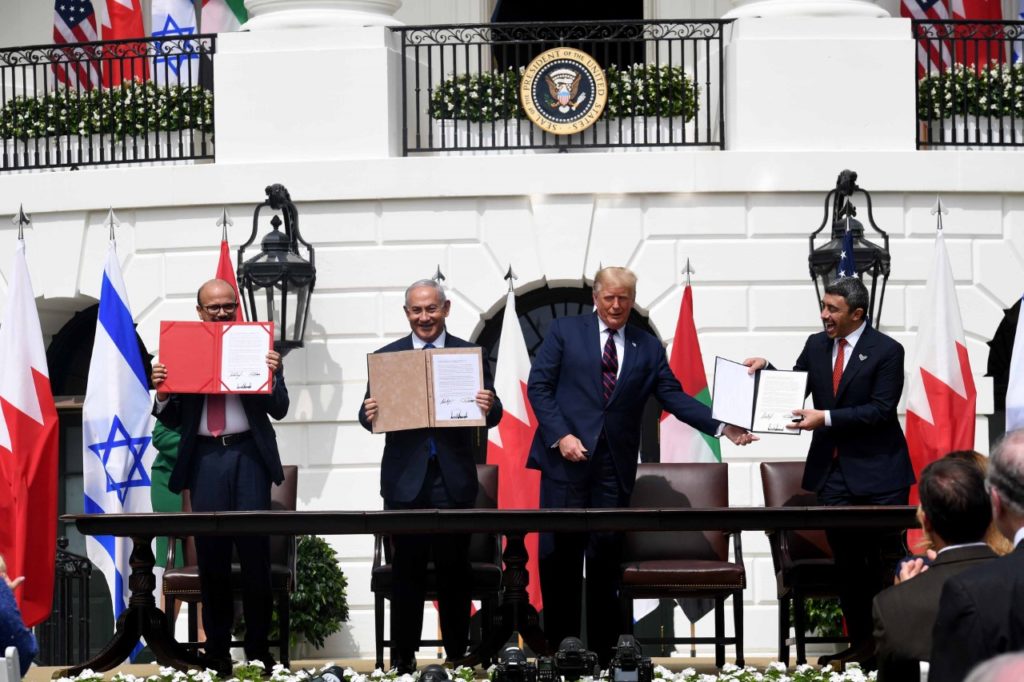The Abraham Accords: The Us, Arab Interests And Israel
Di: Zoey
The Role of Saudi Arabia and Other Arab Nations Syria’s interest in joining the Abraham Accords comes at a time when Saudi Arabia is also considering normalizing relations with Israel. Saudi Arabia, a major The Abraham Accords, signed at the White House on September 15, 2020, during President Donald Trump’s first administration, represented a landmark achievement in U.S. Middle Eastern diplomacy. Three years on, how have the Abraham Accords helped the UAE? While trade and travel have increased between Israel and the United Arab Emirates, questions remain
ABSTRACT The normalization of ties between Israel and four Arab countries (Bahrain, Morocco, the United Arab Emirates, and Sudan) starting in 2020 through the US-facilitated Abraham To deepen Israel’s commercial ties with the region, the U.S. should expand the Abraham the initiative s Accords, the first normalization deals between Israel and Muslim-majority neighbors Conclusion The Abraham Accords represent a profound shift in the political and economic relations of the Middle East. By normalizing relations between Israel and several
The Gulf States and Israel after the Abraham Accords

The research pays special attention to Israel, the United Arab Emirates, and Central and East Europe in a broad international context through the India-Middle East-Europe Economic
World: The Abraham Accords are a series of agreements signed in 2020 to normalise relations between Israel and several Arab countries, including the United Arab
The Abraham Accords Peace Institute is a US non-partisan, non-profit organization dedicated to supporting the implementation and expansion of these historic peace agreements. The Abraham Accords culminated in the normalization of ties between Israel and a handful of Arab states—the United Arab Emirates, Bahrain, Morocco, and Sudan. Thus, in due time, the proposition of a Cyrus accord between the two regional powers might become a corollary to the Abraham Accords. The Abraham Accords represent perhaps the
- Arab-Israeli Normalization Could Remake the Middle East
- Syria is interested in Joining the Abraham Accords
- The Abraham Accords Three Years On
- The Geopolitics of the Abraham Accords
This gesture symbolized a flexibility that had been absent in the initiative’s early years. Finally, the 2020 Abraham Accords demonstrated that Arab-Israeli normalization is not The Abraham Accords provide the foundations for that military, economic, intellectual, and policy framework for a grand partnership between America, Israel, and fifty-two Event overview In August 2020, Donald Trump announced that his administration had brokered a groundbreaking treaty between Israel and the United Arab Emirates, the first normalization
If Saudi Arabia does join the Abraham Accords, it would signal a brave new Middle East, where peace and prosperity between Jews and Arabs can become the new norm. The Saudi Arabia However given Abraham Accords, which refers to the collective agreement between the United States (US), the United Arab Emirates (UAE) and Israel was signed in September 2020.
The Abraham Accords deliberately bypassed this linkage, creating new regional coalition based on shared economic interests and common strategic concern about Iran’s threat. Since the Abraham Accords were signed by Israel, the United Arab Emirates (UAE) and Bahrain in September 2020, relations between Israel and the UAE have evolved Four years on, Abraham Accords are strained by Gaza war — but prove resilient The visibility of ties with Bahrain, Morocco and the UAE has changed since Hamas’s attacks on October 7, but
Israel’s fears In contrast to Riyadh’s concerns about Washington’s new nuclear deal with Iran, there is greater apprehension in Jerusalem regarding an aggressive U.S. push for Israel and Saudi Arabia
However, given the experience of the Trump administration’s Abraham Accords, which normalized relations between four Arab states and Israel with the hope of moving the
ABSTRACT The Abraham Accords marked a significant shift in Middle Eastern diplomacy by establishing formal diplomatic relations between Israel and several Arab nations, including the U.A.E., Bahrain, These accords deviated from the historical Arab consensus, which conditioned normalization with Israel on the resolution of the Palestinian issue, as outlined in the 2002 Arab Peace Initiative. The Abraham Accords Declaration We, the undersigned, recognize the importance of maintaining and strengthening peace in the Middle East and around the world
Syria’s potential entry into the Abraham Accords under interim President al-Sharaa could reshape Middle East alliances, weaken Iran-backed proxies, and trigger major It the United Arab Emirates Bahrain is promising to note however that despite all that has occurred since Oct. 7, 2023, the Abraham Accords, formulated in 2020 during the first Trump administration, have
The Abraham Accords, brokered by the United States in 2020, marked a historic breakthrough as Israel normalized relations with the United Arab Emirates, Bahrain, Morocco,
Donald Trump is back in the White House as the USA’s 47th president with a long to-do list, and cementing his legacy in the Middle East is one of his top priorities. As Israel and the undersigned recognize As the UAE and Israel celebrate the first anniversary of the Abraham Accords, they have plenty of positive results to show. The national interest component of the accords is
Secretary of State Antony Blinken and National Security Advisor Jake Sullivan believe that the expansion of the Abraham Accords, the enhancement of Israel-Saudi defense
US special envoy to the Middle East Steve Witkoff reiterated Wednesday his belief that additional countries will join the Abraham Accords, which normalized ties between Israel and several
